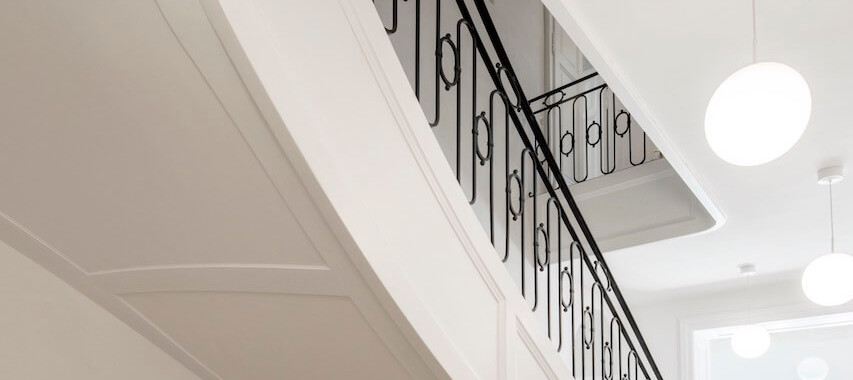- Harald N.

- Dec 30, 2023
- 5 min read
Updated: Dec 31, 2023
Life writes the best stories. For example, when three friends decided to shake up the architecture industry as business partners in the future, and how they managed to win the most coveted design award in the world.
"We all had tears in our eyes," says Sophie Pfeffer of the architecture and design firm "destilat" to PANGAEA about an event in 2020, when they suddenly received the Oscar for interior designers in London. This is awarded by the online platform "Dezeen" among 4,000 submissions worldwide.
MODERN WINE FACTORY FOR WINEMAKER CLEMENS STROBL
The winning project in Kirchschlag am Wagram in the Tulln district in Lower Austria is a true architectural jewel. It is an old estate that was converted into a modern wine factory for winemaker Clemens Strobl. The work for the "destilat" team began with the search for a suitable property, where the architects accompanied the client - and found a 4,000 square meter ensemble of operating facilities, residential, and bathing houses during the inspection.
However, the buildings were poorly preserved and had to be completely renovated and supplemented by new buildings. The two-story residential building presents itself on the outside in its historical appearance - inside, the convoluted building was completely redeveloped. The large main staircase was "reversed" for this purpose and a railing was developed in a complementary historical design.
Authentic building materials and craft techniques were the focus of the object's revitalization: the antique herringbone and panel parquet floors were discovered in the 18th and 19th-century estate and the stone floor was made up of old, tumbled travertine; walls and ceilings were painted in traditional brushstroke technique, acoustic ceilings hidden under the tonnage of the historical walls and the original box windows restored and provided with "Histoglas".
To ensure that all these rooms - from the wellness area in the cross vault to the converted attic - can be shown in the best possible light, destilat also developed the entire lighting system.
RENOWNED AWARDS AT HOME AND ABROAD
With the design of the Gut Wagram winery, "destilat" not only won the Oscar among interior designers but also many other renowned awards in the industry. Impact: "We have become known through this and are invited to competitions," says Sophie Pfeffer. She has been a junior partner of a male triumvirate since 2019, who decided in 2009 to make a business relationship out of a friendly one.
Henning Weimer, one of the three business partners, was in retail and owned a furniture store. Harald Hatschenberger was previously involved in industrial design, and Thomas Neuber is a trained business economist who originally came from the music industry. Today, the "destilat Design Studios", which exist in Vienna and Linz, employ 15 people nationwide and internationally in the fields of interior design and furniture design. How did they come up with the name "destilat"? "We consider the product the essence of every process - concentrated, reduced, distilled," describes Henning Weimer the company's name-finding.
"Weimer believes that the current boom in the industry is also due to the pandemic. In an interview with PANGAEA, he said, "Corona was a catalyst for us; suddenly everyone wanted to change their living environment and had the time and inspiration to think about it." Weimer does not confirm that the customers who come to "destilat" must also have the necessary funds, he only said: "He should have a sense of beauty!" In the normal case, the customer states his budget for the project, after which an estimate is made of whether the implementation of his wishes is realistic. The winery at Wagram in Lower Austria was also an exception.
LIKE A YACHT ABOVE THE ROOFS OF VIENNA
On the "destilat" website, some impressive interior projects of the architect group can be seen. Notable is the "Penthouse L" in Vienna, where an exciting interplay of luxurious materials and simple forms runs like a thread through the apartment. The design takes inspiration from the location and characteristics of the approximately 165 square meters of living space and 380 square meters of terrace area, including an outdoor sauna, whirlpool, and infinity pool. As the 9th and 10th floors of a new building, the apartment, along with a three-sided terrace, floats like a yacht above the roofs of Vienna, and therefore a little "above things".
Therefore, many of the custom-made wooden fittings appear to be floating - from the dressing room and bedroom with en-suite bathroom, to the boudoir with a luxurious dressing table. Plenty of storage space and some hidden doors were invisibly installed into the wall from laminated walnut wood. The earthy wooden elements provide a clear contrast to the floors: glossy bright and large-format porcelain tiles (with a marble look) in the representative rooms and high-pile velour in the private rooms. Materials that subtly reference the 1970s with backlit mirrors.
The generous living kitchen also presents itself like a ship. Its interior was crafted to the smallest detail from dark walnut behind white high-gloss fronts. The central element of the living room is the bio-ethanol fireplace. Slightly raised and embedded in a light marble base, it is supported by a large-format, dark porcelain tile wall in a marble look that not only reflects the flames but also the material aesthetics of classic modernism. The base also forms the first step of the metal staircase to the upper floor, whose delicate bracing plays a supporting role and makes the construction appear weightless.
"Once again, this project was about distilling the many ideas of the clients into a coherent whole, focusing their vision and guiding them in decision making," Weimer describes this showcase project of his company.
SUITABLE FRAME FOR AN EXCLUSIVE AUTOMOBILE COLLECTION
The "Lounge Z", realized for a private individual, is also exceptional. "Destilat" integrated an open lounge into the spacious garage for a lover of exclusive vehicles who wanted a suitable architectural framework for his automobile collection.
For this purpose, a separate area was defined in the two-story structure that leads downwards via a three-step staircase and is thus spatially separated from the garage. The automobiles are simultaneously elevated and given a museum-like character by presenting the collection on a pedestal.
The two fixed main elements, which serve as a hospitality and bar module and as a spatial separation element or shelf, combine teak wood bodies with green marble slabs, which are formally and constructively combined by a frame of black tubular steel. With its vertical teak wood slats, the shelf defines subtle boundaries of space, allowing for glimpses from the lower lounge into the actual garage area and vice versa.
For Weimer of "destilat", a relaxed place in a stylish environment has been created with this project, which offers a clear view of precious collector's items and invites relaxed discussions among like-minded people.
PRIVATE RESIDENCES IN SPAIN AND GREECE
Among the clients of "destilat" are both private clients and hotels. "However, we also deal intensively with corporate architecture and the integration of brands and products into the respective architecture. At the same time, we support our clients in the joint development of series products in the furniture sector," added Henning Weimer, who, together with his team, is currently engaged in designing private residences in Spain and Greece.
























































Comments